Vanessa Toborek
Scientific Theory of a Black-Box: A Life Cycle-Scale XAI Framework Based on Constructive Empiricism
Feb 02, 2026Abstract:Explainable AI (XAI) offers a growing number of algorithms that aim to answer specific questions about black-box models. What is missing is a principled way to consolidate explanatory information about a fixed black-box model into a persistent, auditable artefact, that accompanies the black-box throughout its life cycle. We address this gap by introducing the notion of a scientific theory of a black (SToBB). Grounded in Constructive Empiricism, a SToBB fulfils three obligations: (i) empirical adequacy with respect to all available observations of black-box behaviour, (ii) adaptability via explicit update commitments that restore adequacy when new observations arrive, and (iii) auditability through transparent documentation of assumptions, construction choices, and update behaviour. We operationalise these obligations as a general framework that specifies an extensible observation base, a traceable hypothesis class, algorithmic components for construction and revision, and documentation sufficient for third-party assessment. Explanations for concrete stakeholder needs are then obtained by querying the maintained record through interfaces, rather than by producing isolated method outputs. As a proof of concept, we instantiate a complete SToBB for a neural-network classifier on a tabular task and introduce the Constructive Box Theoriser (CoBoT) algorithm, an online procedure that constructs and maintains an empirically adequate rule-based surrogate as observations accumulate. Together, these contributions position SToBBs as a life cycle-scale, inspectable point of reference that supports consistent, reusable analyses and systematic external scrutiny.
Improving Compactness and Reducing Ambiguity of CFIRE Rule-Based Explanations
Jan 07, 2026Abstract:Models trained on tabular data are widely used in sensitive domains, increasing the demand for explanation methods to meet transparency needs. CFIRE is a recent algorithm in this domain that constructs compact surrogate rule models from local explanations. While effective, CFIRE may assign rules associated with different classes to the same sample, introducing ambiguity. We investigate this ambiguity and propose a post-hoc pruning strategy that removes rules with low contribution or conflicting coverage, yielding smaller and less ambiguous models while preserving fidelity. Experiments across multiple datasets confirm these improvements with minimal impact on predictive performance.
Four Quadrants of Difficulty: A Simple Categorisation and its Limits
Jan 04, 2026Abstract:Curriculum Learning (CL) aims to improve the outcome of model training by estimating the difficulty of samples and scheduling them accordingly. In NLP, difficulty is commonly approximated using task-agnostic linguistic heuristics or human intuition, implicitly assuming that these signals correlate with what neural models find difficult to learn. We propose a four-quadrant categorisation of difficulty signals -- human vs. model and task-agnostic vs. task-dependent -- and systematically analyse their interactions on a natural language understanding dataset. We find that task-agnostic features behave largely independently and that only task-dependent features align. These findings challenge common CL intuitions and highlight the need for lightweight, task-dependent difficulty estimators that better reflect model learning behaviour.
Beyond Shallow Heuristics: Leveraging Human Intuition for Curriculum Learning
Aug 27, 2025Abstract:Curriculum learning (CL) aims to improve training by presenting data from "easy" to "hard", yet defining and measuring linguistic difficulty remains an open challenge. We investigate whether human-curated simple language can serve as an effective signal for CL. Using the article-level labels from the Simple Wikipedia corpus, we compare label-based curricula to competence-based strategies relying on shallow heuristics. Our experiments with a BERT-tiny model show that adding simple data alone yields no clear benefit. However, structuring it via a curriculum -- especially when introduced first -- consistently improves perplexity, particularly on simple language. In contrast, competence-based curricula lead to no consistent gains over random ordering, probably because they fail to effectively separate the two classes. Our results suggest that human intuition about linguistic difficulty can guide CL for language model pre-training.
CFIRE: A General Method for Combining Local Explanations
Apr 01, 2025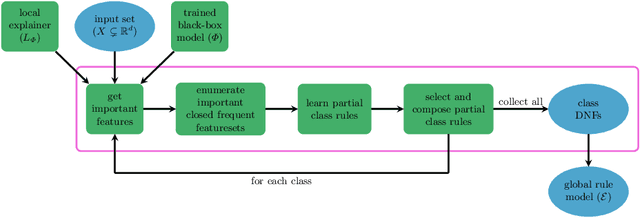
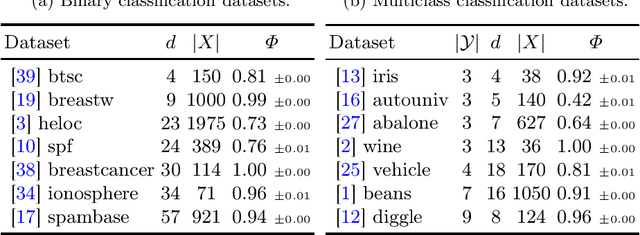
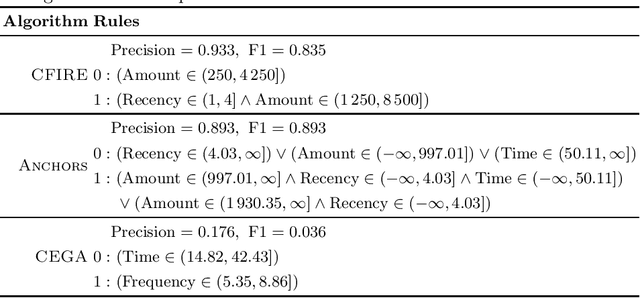
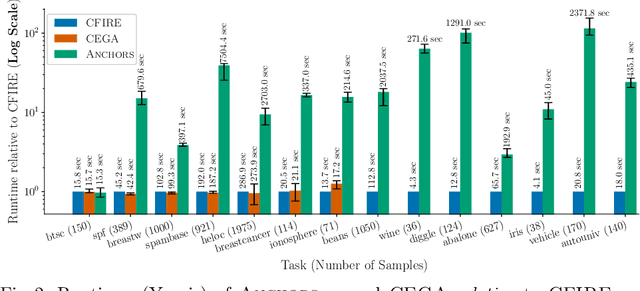
Abstract:We propose a novel eXplainable AI algorithm to compute faithful, easy-to-understand, and complete global decision rules from local explanations for tabular data by combining XAI methods with closed frequent itemset mining. Our method can be used with any local explainer that indicates which dimensions are important for a given sample for a given black-box decision. This property allows our algorithm to choose among different local explainers, addressing the disagreement problem, \ie the observation that no single explanation method consistently outperforms others across models and datasets. Unlike usual experimental methodology, our evaluation also accounts for the Rashomon effect in model explainability. To this end, we demonstrate the robustness of our approach in finding suitable rules for nearly all of the 700 black-box models we considered across 14 benchmark datasets. The results also show that our method exhibits improved runtime, high precision and F1-score while generating compact and complete rules.
Cup Curriculum: Curriculum Learning on Model Capacity
Nov 07, 2023

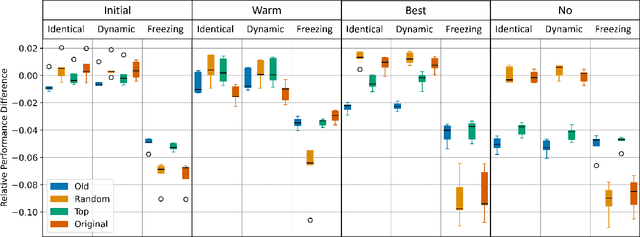
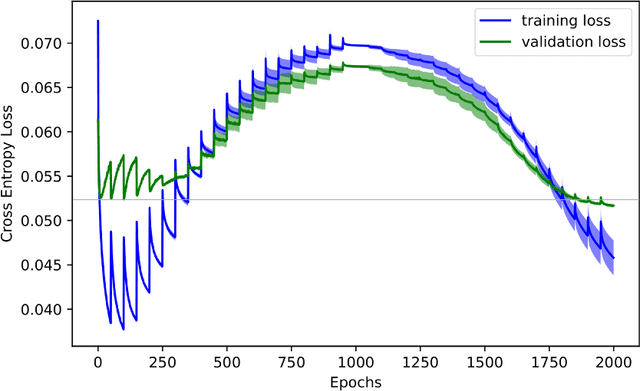
Abstract:Curriculum learning (CL) aims to increase the performance of a learner on a given task by applying a specialized learning strategy. This strategy focuses on either the dataset, the task, or the model. There is little to no work analysing the possibilities to apply CL on the model capacity in natural language processing. To close this gap, we propose the cup curriculum. In a first phase of training we use a variation of iterative magnitude pruning to reduce model capacity. These weights are reintroduced in a second phase, resulting in the model capacity to show a cup-shaped curve over the training iterations. We empirically evaluate different strategies of the cup curriculum and show that it outperforms early stopping reliably while exhibiting a high resilience to overfitting.
An Empirical Evaluation of the Rashomon Effect in Explainable Machine Learning
Jun 29, 2023Abstract:The Rashomon Effect describes the following phenomenon: for a given dataset there may exist many models with equally good performance but with different solution strategies. The Rashomon Effect has implications for Explainable Machine Learning, especially for the comparability of explanations. We provide a unified view on three different comparison scenarios and conduct a quantitative evaluation across different datasets, models, attribution methods, and metrics. We find that hyperparameter-tuning plays a role and that metric selection matters. Our results provide empirical support for previously anecdotal evidence and exhibit challenges for both scientists and practitioners.
A New Aligned Simple German Corpus
Sep 06, 2022
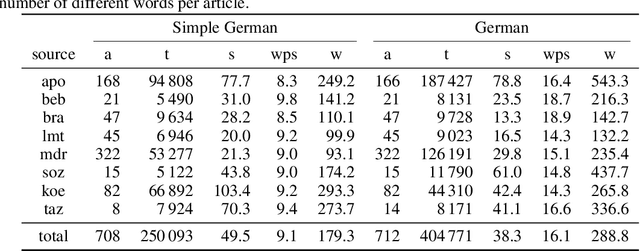

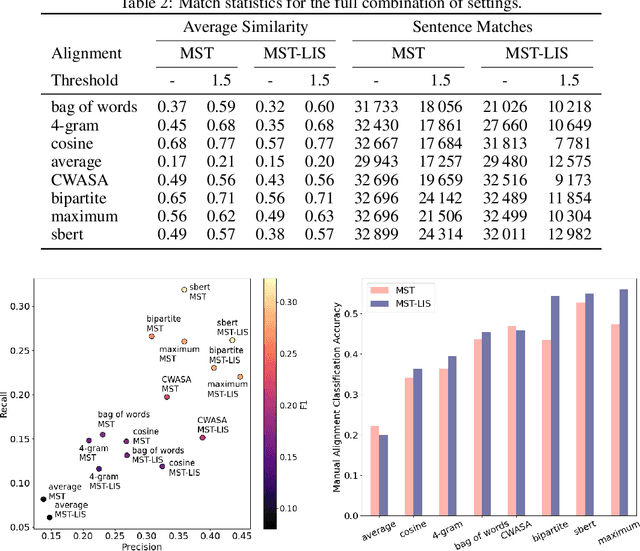
Abstract:"Leichte Sprache", the German counterpart to Simple English, is a regulated language aiming to facilitate complex written language that would otherwise stay inaccessible to different groups of people. We present a new sentence-aligned monolingual corpus for Simple German -- German. It contains multiple document-aligned sources which we have aligned using automatic sentence-alignment methods. We evaluate our alignments based on a manually labelled subset of aligned documents. The quality of our sentence alignments, as measured by F1-score, surpasses previous work. We publish the dataset under CC BY-SA and the accompanying code under MIT license.
Explainable Machine Learning with Prior Knowledge: An Overview
May 21, 2021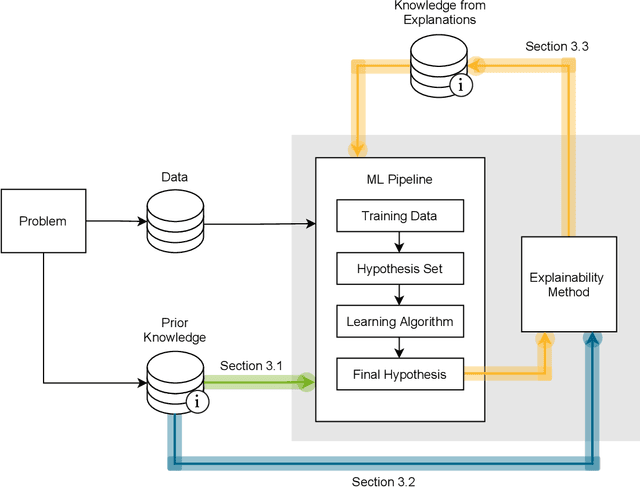
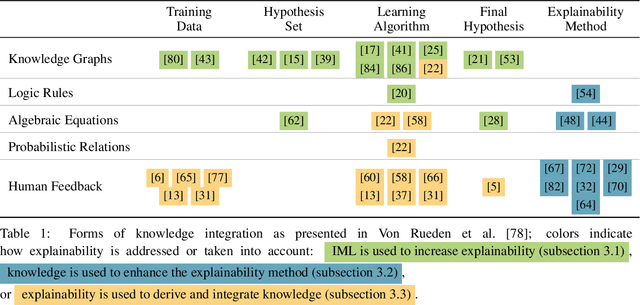
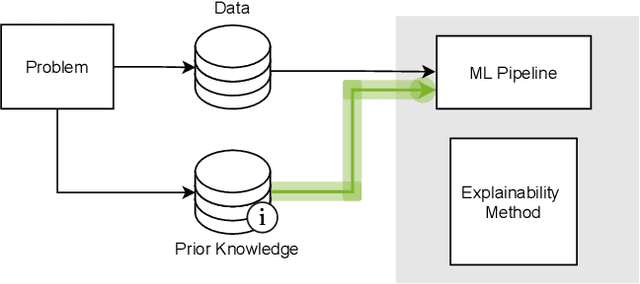
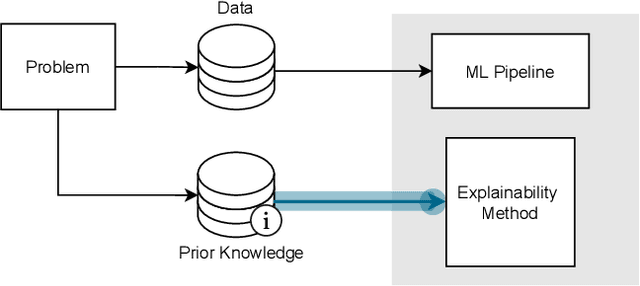
Abstract:This survey presents an overview of integrating prior knowledge into machine learning systems in order to improve explainability. The complexity of machine learning models has elicited research to make them more explainable. However, most explainability methods cannot provide insight beyond the given data, requiring additional information about the context. We propose to harness prior knowledge to improve upon the explanation capabilities of machine learning models. In this paper, we present a categorization of current research into three main categories which either integrate knowledge into the machine learning pipeline, into the explainability method or derive knowledge from explanations. To classify the papers, we build upon the existing taxonomy of informed machine learning and extend it from the perspective of explainability. We conclude with open challenges and research directions.
 Add to Chrome
Add to Chrome Add to Firefox
Add to Firefox Add to Edge
Add to Edge